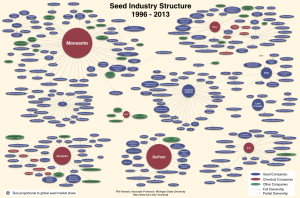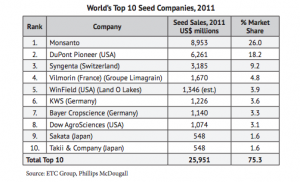
Dr. Philip Howard of Michigan State University has just updated his very telling graphics representing consolidation in the global seed industry.
“Not surprisingly, acquisitions have continued,” says Dr. Howard. “Despite the economic downturn since the last version of these graphics were released in 2008, there have been more than 70 seed company acquisitions by the top eight firms, as well as a number of biotech company acquisitions and joint ventures.”
“Limagrain/Vilmorin in particular has picked up the pace of buyouts,” Howard says. “It remains far behind the top three firms in market share, however.”
Three firms maintain their dominant position (Monsanto, DuPont, and Syngenta) and collectively control more than half of the market, up from 22% in 1996.
Howard adds, “The big six chemical/seed companies have also increased their cross-licensing agreements to share genetically engineered traits, strengthening the barriers to entry for smaller firms that don’t have access to these expensive technologies.”
In 2009, I documented these and other consequences of seed industry consolidation on farmers and independent seed companies in a report titled Out of Hand. The research focused on seed choice and prices that farmers were paying for corn and soybean seed. Also apparent from this research was a stark decline in non-genetically engineered seed options.
The following year, the U.S. departments of Agriculture and Justice initiated a national conversation on competition concerns in agricultural industries, including seed. Yet, more than 15,000 public comments later, and neither agency has provided a meaningful response to the public about what they discovered and what they’re doing to confront the problems raised.
 OSA provided detailed descriptions of the problems, as well as solutions, in this letter and continues to raise the visibility of the consequences of seed concentration for farmer choice, innovation, and food security through public presentations and policy organizing.
OSA provided detailed descriptions of the problems, as well as solutions, in this letter and continues to raise the visibility of the consequences of seed concentration for farmer choice, innovation, and food security through public presentations and policy organizing.
The ETC Group also released new data this month on agricultural input industries. The report included market share estimates for seed (see graphic to the right). The full report can be downloaded here.
